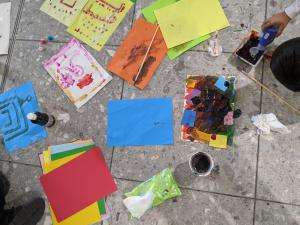A human crisis: social workers on the frontline with Afghan refugees

Published by Professional Social Work magazine, 03 September 2021
Gifty Osei is a social worker with Heathrow Travel Care - the crisis social work team based permanently at the airport, dealing with vulnerable people in crisis or distress.
She has been meeting new arrivals from Afghanistan as they touch down on UK soil. As the humanitarian crisis unfolded during August, coaches were waiting to take people to hotels across London to quarantine, but there were more immediate needs as flights came into Heathrow, in what became a near-24 hour operation.
Gifty said: “It was very chaotic and emotionally charged. I was meeting people as they stepped off flights and the thing that was immediately apparent was that most of the children didn’t have shoes.
“A lot of the adults didn’t have shoes either, and the children were dirty. They had only rucksacks, indicating that they only had time to grab a few things and leave.
“Many of the children had bruises and grazes from the stampedes at Kabul airport, and many were unaccompanied.
“There were pregnant women, one who was nine months’ pregnant, about to give birth and holding a small child. She was so grateful for our assistance, that we could take her child so she could move a bit more freely.”
The new arrivals were taken through airport security, behind a screened area, and were met with food, water, milk for the children, clothes and nappies.
“I was a bit overwhelmed,” Gifty confesses. “As a practitioner I come to work every day and have to deal with what I am seeing, but at times this situation was surreal and quite emotional.
“We were cleaning up the children with wipes and offering them clean clothes. They very strongly wanted to keep their old clothes and of course, we let them keep them. We just wanted to make sure they were appropriately dressed.
“And you could see people’s eyes were red from not sleeping. They hadn’t eaten, hadn’t washed. I can’t imagine living in a house and then suddenly being shipped off to another country.”
Gifty describes what was initially needed at the airport as transcending language barriers: “They needed a smiling face and a willing hand.
“But we also have clinical psychologists who speak the language, and among the refugees were British Afghans who would jump in and help interpret if they could see someone was struggling. Everyone knew to pull together and help.”
Gifty says the predominant factor her team looks out for is trauma, and particularly the trauma faced by unaccompanied minors arriving in a strange land. Many families lost each other in the chaos of departure.
“There was a man who wanted to find his eight and 12-year-old children, and he wasn’t even sure they had made the flight.
“I thought to myself ‘My god, how horrifying’ as I couldn’t imagine being separated from my own kids.
“Then when we heard about the blast at Kabul airport, everyone was on their phones, asking about the people they had left behind. It was really traumatic.”
But there was also relief, and sadness, Gifty says.
“The Afghan people are resilient. They are remarkable, and they are grateful. You can see the gratitude in their faces. This will enable them to thrive in their new lives in the UK. It will help them accept their new situation.
“They are also very family-oriented. They wanted to regroup at the hotels in quarantine, and I can imagine them getting to their rooms and saying, ‘We made it.’”
Next Steps
Gifty advises social workers readying themselves at local authorities up and down the UK to be alert to the symptoms of trauma, and to be prepared for many unaccompanied children.
“Children can be quite resilient, but they are also in an unfamiliar land where they don’t speak the language. We communicated through play and colouring in, and they responded well to that.
“It’s important with all the people you see to determine their mental state - many may feel incredibly guilty because of the family they left behind. And many are dealing with bereavements, too.”
Gifty praised the combined efforts of the Red Cross and other agencies involved in the preparations in the UK.
“Communities mobilise, and donations come in... and from the perspective of the airport, we are just the first stop on a journey into a new life.”
Fact Box
- Up to 500,000 Afghans could attempt to flee by the end of this year, according to the United Nations
- More than 123,000 civilians were evacuated by US and coalition forces between 14 and 31 August
- The US flew 80,000 civilians out of Kabul - 91 per cent were Afghans and other foreign nationals
- The UK flew out 15,000 people, 53 per cent were Afghans
- 3.5 million Afghans are displaced within Afghanistan
- 2.5 million have already fled
- Drought and food shortages could bring a humanitarian disaster within the country
